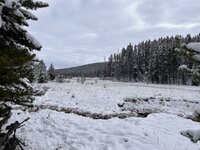Poser
WKR
Interesting responses. Yes, you can and should lighten up that pack a bit (sounds like you already have) without having to spend $1600 on a lighter pack, puffy etc.
I suppose that after reading the responses, my question is what kind of real performance advantage does one achieve with skimping down to "ultralight" hunting vs. "lightweight" for the purposes of day hunting?
Backpacking? totally get it as there is a huge difference between, say a 68 lbs pack weight and a 51 lbs pack weight for virtually everyone: fit, strong, tough, fast, 225 lbs or 165 lbs: you're going to notice that weight difference and associated fatigue difference.
At some point, however, you seem to hit a tipping point of "light" weight where a few lbs makes no perceivable or practical difference in performance for anyone who is in shape for carrying a pack and not racing for time where there are differences of seconds between the racers. 21 lbs vs. 16 lbs? I'm not sure I could even get an objective performance metric difference for myself if we did a hill climb for time with the two weights. If you're in a very light bodyweight range of, say 120 lbs, it may make a difference. If you put that weight on a dedicated runner or a SkiMo racer, they probably would have (and certainly notice) a performance difference, but somebody in shape for mtn backpacking, short of doing the steepest, hardest, longest, nastiest objective around, I wouldn't put much thoughts into it. In fact, for day hunting, I'd be more prone to throwing a thermos in my pack, bringing a 16 oz meatball sandwich or other luxury items simply because its a day hunt.
Also, you could put 11 lbs in a day pack without a frame and 21 lbs in a day pack with a frame and may perform better with 21 lbs on your hips than 11 lbs on your shoulders. All weight is not equal and optimal doesn't always = practical. At the end of the day, its a day hunt and if you're getting your ass kicked because of a 25 lbs pack weight, your problem is not the weight of the pack.
I suppose that after reading the responses, my question is what kind of real performance advantage does one achieve with skimping down to "ultralight" hunting vs. "lightweight" for the purposes of day hunting?
Backpacking? totally get it as there is a huge difference between, say a 68 lbs pack weight and a 51 lbs pack weight for virtually everyone: fit, strong, tough, fast, 225 lbs or 165 lbs: you're going to notice that weight difference and associated fatigue difference.
At some point, however, you seem to hit a tipping point of "light" weight where a few lbs makes no perceivable or practical difference in performance for anyone who is in shape for carrying a pack and not racing for time where there are differences of seconds between the racers. 21 lbs vs. 16 lbs? I'm not sure I could even get an objective performance metric difference for myself if we did a hill climb for time with the two weights. If you're in a very light bodyweight range of, say 120 lbs, it may make a difference. If you put that weight on a dedicated runner or a SkiMo racer, they probably would have (and certainly notice) a performance difference, but somebody in shape for mtn backpacking, short of doing the steepest, hardest, longest, nastiest objective around, I wouldn't put much thoughts into it. In fact, for day hunting, I'd be more prone to throwing a thermos in my pack, bringing a 16 oz meatball sandwich or other luxury items simply because its a day hunt.
Also, you could put 11 lbs in a day pack without a frame and 21 lbs in a day pack with a frame and may perform better with 21 lbs on your hips than 11 lbs on your shoulders. All weight is not equal and optimal doesn't always = practical. At the end of the day, its a day hunt and if you're getting your ass kicked because of a 25 lbs pack weight, your problem is not the weight of the pack.




